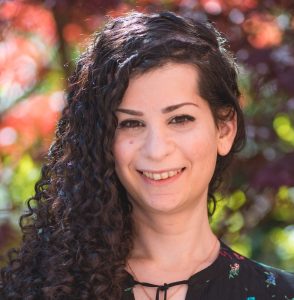This International Women’s Day 2021, we decided to connect with inspiring women championing inclusion at UBC to hear their reflections on this day and perspectives on a more equitable and inclusive future.

she/her
Assistant Professor, School of Social Work
What does IWD mean to you?
As a scholar, social worker, and a trans woman, the International Women’s Day is for me about remembering that lived experiences of womanhood and gender diversity are rich sources of knowledge, and remarkable catalysts for connecting, building solidarity, and promoting equity and social justice. IWD is also an opportunity for me to reflect on the many women, in particular, who have contributed so much to my growth and development as a researcher, practitioner, and human, including those in my scholarly and professional life, as well as those in my family of origin and families of choice.
How do you reflect on your research on sexual and gender minority (SGM) in relation to IWD?
My research broadly centres questions related to sexual and gender minority (SGM) health, social work and other professional practice with SGM communities, as well as aging in SGM populations. Many who identify as SGM are also women, and/or are in some way affected by profound inequities related to gender. Examining and addressing these questions is very important when we begin imagining and working our way to a fairer and better world for all who feel that International Women’s Day in some way honours their voices, hopes, and aspirations.
How does social work help in betterment of women, trans, and gender diverse people in the society?
Social justice is a central tenet that shapes social work scholarship and practice. In light of the significant inequities related to gender that unfortunately continue shaping the social conditions and experiences of women (cis and trans), along with those of trans, non-binary, and Two-Spirit people and communities, I believe social work scholars and practitioners can draw on their commitment to social justice to stand in solidarity and mobilize with these groups on evolving human rights issues they identify as being most salient.
Although the profession does have a troubled history in reinforcing the oppression of many marginalized communities, including (among many others) Indigenous and racialized women, I do believe we can reflect on this history critically so that we can learn from our past and transform our discipline and profession as we move forward.
What is the one thing/idea you want to challenge this IWD?
This is a very difficult question for me to answer! Though this might not come across as a challenge, I do hope all of us who are coming together to celebrate International Women’s Day take into account the rich complexity, diversity, and intersectionality of the issues and experiences of women (cis and trans), as well as all others who feel represented by IWD, when we use this day to mobilize against and resist the array of gender-based inequities experienced among those in these groups.
If you were to share a self-care tip for other women, what would it be?
For me, the best self-care strategy – one that most strongly corresponds with what International Women’s Day means to me – has been to connect with women I deeply admire and respect, including my 90 year-old grandmother who is among my closest allies, and a mentor whose combined wisdom and humility guides much of my life and work.